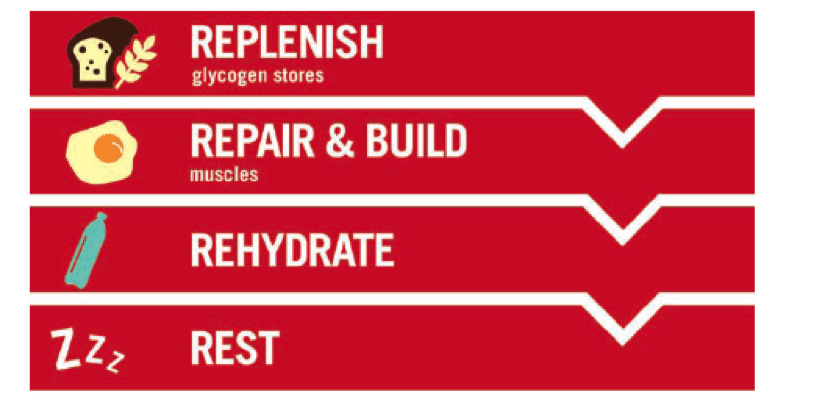Recovery phases should not be seen as a fixed ‘window of time’, which opens after training and then shuts precisely 29 min and 59 secs later, but should be viewed more as a continuum. However, immediately after training, i.e. in the early phase of recovery, several metabolic processes in the body, which enhance the storage of glycogen in the muscle and promote the building of new muscle protein, are maximally active. If the body is simultaneously provided with the right nutrients during this time, these recovery phases can be maximally utilized.
Carbohydrates
Carbohydrates are required to replenish depleted energy stores in the body, i.e. the glycogen stores in the liver and muscles. Directly following a training session the total amount of carbohydrate required depends on numerous factors, such as: the training plan, training stress, volume of work and exercise goal, as well as the timing of meals planned later that day. It is fact, that an enhanced storage of carbohydrates in the energy stores of the body can be achieved immediately after a training session. The immediate, maximal replenishment of depleted glycogen stores is especially important for athletes who want to be able to perform at maximal intensity again only a short while after the last hard training session has ended. In this case the ‘reloading’ of stores should begin immediately after the training session, with approx. 0.8-1.2 g of carbohydrates per kg bodyweight. An hour later further carbohydrate-rich snacks or meals should be incorporated. Keep in mind that the most important factor in the rate of replenishment of the body’s own glycogen stores is the total amount of carbohydrates consumed. If the training session wasn’t overly hard and of short duration, a fast supply of carbohydrates is generally not necessary. In situations like these it is certainly possible to wait until the next full meal to replenish the glycogen stores.
Protein
During exercise the body shifts from a well-balanced protein metabolism to catabolism and muscle tissue structures get damaged. Following a training session our metabolism is working flat out, and the previous training load has stimulated the body to build new muscle protein. Especially after an intense endurance exercise or weight training session it makes sense to supply the body with the optimal amount of high-quality protein (approx. 20-25g dependant on several factors; for young adults 0.3g/kg bodyweight is recommended), such as milk protein, to promote muscle repair and building processes. However, the body doesn’t only react more sensitively to protein directly after a session, but actually for up to approx. 24 hours following a workout. The current scientific recommendation is therefore to plan the right amount of protein immediately after intense/hard sessions (key training sessions), as well as in regular intervals spread across the day, and also shortly before going to bed if required.
Fluids and electrolytes
Sophisticated and well planned fluid and electrolyte strategies after exercise are only necessary if there are very short recovery periods between workouts, and there is an acute and large loss of fluids and salts (i.e. sodium). Otherwise it is possible to address the fluid and electrolyte loss through normal drinking and eating habits.
Suggestions for recovery meals (add fluids depending on requirements)
A) Low carb options including approx. 25g of protein (e.g. following a low-intensity or moderately hard training session)
- 1 Protein shake (e.g. PROTEIN PLUS 92%)
- 250ml PROTEIN PLUS Sportsmilk
- 1 portion of low fat, plain Greek yoghurt (200g) with low-sugar fruits (e.g. raspberries)
B) Carbohydrate-rich options including approx. 50-60g carbohydrates and approx. 20-25g protein (e.g. following an intense and prolonged training session)
- 1 PROTEIN PLUS 92% shake + 2 handfuls (approx. 70g) raisins
- 1 tub cottage cheese (200g) with 2 tablespoons honey and 1 sliced banana
- 1 PROTEIN PLUS 33% bar with a large glass of fruit juice
- 1 large portion RECOVERY shake (90g powder + 350ml water)
- 1 soft pretzel stick with low-fat cream cheese and 2 slices of turkey breast + one small ripe banana
With over 25 years experience in professional sports, the Sports Scientist and expert book author on Swimming Holger Lüning is aware that the correct nutritional measures in the early phases of recovery are all too often neglected. “Especially for athletes that do not have an appetite immediately after hard training sessions I recommend liquid nutrition, such as recovery shakes. As a result, the first intake of nutrients even immediately after hard sessions is ensured, as many find it easier to drink something rather than eat in such situations”.
Conclusion:
Immediately after an intense training session the correct choice of nutrients influences recovery – an important part for training success. But also later meals and snacks should be carefully planned and selected. It’s important not to forget that sleep plays a major role during recovery and that nutrition also influences this period. A sub-optimally created evening meal can influence sleep quality and reduce night-time recovery. It’s essential to always remember: every athlete is an individual. A one-size-fits-all recovery nutrition strategy does not exist!



